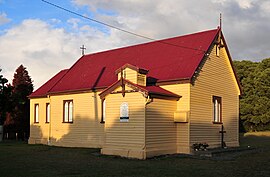| Meander Tasmania | |||||||||||||||
|---|---|---|---|---|---|---|---|---|---|---|---|---|---|---|---|
 St Saviour's Anglican Church | |||||||||||||||
| Coordinates | 41°39′S 146°37′E / 41.650°S 146.617°E | ||||||||||||||
| Population | 328 (2016 census)[1] | ||||||||||||||
| Established | 1907 | ||||||||||||||
| Postcode(s) | 7304 | ||||||||||||||
| Elevation | 291 m (955 ft)[2] | ||||||||||||||
| Location |
| ||||||||||||||
| LGA(s) | Meander Valley Council | ||||||||||||||
| Region | Launceston | ||||||||||||||
| State electorate(s) | Lyons | ||||||||||||||
| Federal division(s) | Lyons | ||||||||||||||
| |||||||||||||||
| |||||||||||||||
Meander is a rural locality and town in the local government area of Meander Valley in the Launceston region of Tasmania. The locality is about 34 kilometres (21 mi) south-west of the town of Westbury. The 2016 census has a population of 328 for the state suburb of Meander.[1]
In 2011 it had a population of 415, forty percent of whom worked directly in agriculture, many in the dominant industries of grazing of sheep and cattle, and the dairy industry. The surrounding land has been modified by the original Indigenous inhabitants, who turned forest into grassland, and the later settlers, who have created extensive channels for irrigation and drainage. The town is 24 kilometres (15 mi) south of the town of Deloraine, Tasmania and is bisected by the Meander River. It sits between Quamby Bluff and Mother Cummings Peak of the Great Western Tiers mountain range.
Meander's surrounds had been inhabited for thousands of years by the Pallittorre, part of the Northern Tribe of Aboriginal Tasmanians. European immigrants began moving into the area in the 1820s and they came into often violent conflict with the Pallittorre. The Pallittorre were removed from the land by a combination of deliberate government policy, disease and the conflicts with the new settlers. Land grants were first made to the European settlers from 1828, firstly of large areas but later for areas of under 100 acres (40 ha). The town of Meander was first gazetted in 1901, though never built as intended, then finally gazetted in another location in 1907. Industry in the town has included sawmilling, dairy, a cheese factory, and an abattoir.
Meander Primary school, built c.1910–11, contains buildings relocated from closed schools formerly in surrounding areas. It, and the adjacent St Saviour's Anglican church, have been classed a "historic precinct" by the National Trust. The town has had a Methodist church—later part of the Uniting Church in Australia—and a Baptist church, but only the Anglican church remains in use. The town has a single store, with a post office agency, and a community hall. Timberworld, a timber and prefabricated home supplier, was formerly run by Kim Booth, leader of the Tasmanian Greens political party. The town has had cricket, basketball, badminton, sheep dog and Australian rules football clubs. Two of the football club's players went on to play in the Victorian Football League, a cricket chairman was awarded an Order of Australia medal for his services to the area, and the town featured in the early life of noted Australian country music singer Jean Stafford.
- ^ a b "2016 Census Quick Stats Meander (Tas.)". quickstats.censusdata.abs.gov.au. Australian Bureau of Statistics. 23 October 2017. Retrieved 13 September 2020.
- ^ Cite error: The named reference
weather1was invoked but never defined (see the help page).
